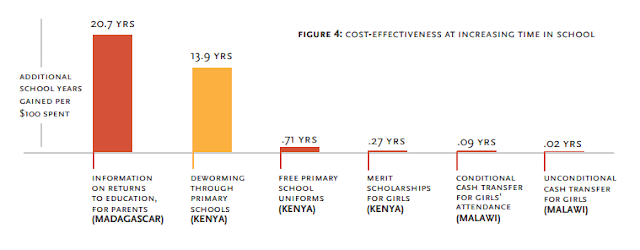Does deworming help education?
Many people say that deworming is a cost-effective way to educate children in the developing world. A more thorough analysis of the evidence suggests this is probably not quite right.
----------------------------------------------------------------------------
It's a really common motif in discussions about smart philanthropy. You look at a range of different things, and show that deworming is more cost-effective than, say, school uniforms or cash transfers at getting kids into school -- many people have said it, including me.
Other people who have used this example include Caroline Fiennes who said in her book "it ain't what you give, it's way that you give it" that "Deworming (as it's charmingly called) can keep a child in school for a year for just $40"
The populariser of the meme, I suspect, was J-PAL, who issued this 2012 paper, entitled "Deworming: a best buy for development", and stated that $100 can buy you 13.9 years of education1.
However it's not that simple.
Since then doubts have been cast over these findings by the Cochrane Collaboration, who state in a review dated 2015 that "There is good evidence that regular treatment probably has no effect on <...> exam performance (moderate quality evidence)"
The Cochrane Review included "44 trials with a total of 67,672 participants, and an additional trial of one million children". The J-PAL paper refers back to a 2004 study by Miguel and Kremer, and this is one of the studies included within the Cochrane Review's meta-analysis, so I suspect that the Cochrane Review is the more credible source.
So it seems that there is actually no effect on exam performance, and we can't be confident about school attendance either.
Is Deworming a waste of time?
If we forget about education, we might still decide that deworming is worthwhile because of the health benefits, however even looking at those, the review is fairly damning.2
Now that we see no signs of benefit to the dewormed children over the coming few years, should we give up on deworming altogether?
Well, we can be fairly confident on the longer term impacts set out in the Baird et al study Worms at Work. In particular, they seem to show that an increase in income of around 15% should be expected among those who have been dewormed. (although this doesn't discount the possibility of displacement effects, i.e. the possibility that those who have been dewormed are getting extra income at the cost of other people)
----------------------------------------------------------------------------
Footnotes
1 The JPAL paper also included language such as "rigorous evidence has shown that treating children for worms—which affect an estimated 600 million school-aged children worldwide—improves school attendance, health, and long-run productivity", so readers of this could be forgiven for feeling confident in those conclusions.↩
2 Here's what the Cochrane Review concluded: "There is good evidence that regular treatment probably has no effect on average height (moderate quality evidence), haemoglobin (low quality evidence), formal tests of cognition (moderate quality evidence), or exam performance (moderate quality evidence). We do not know if there is an effect on school attendance (very low quality evidence)."↩

